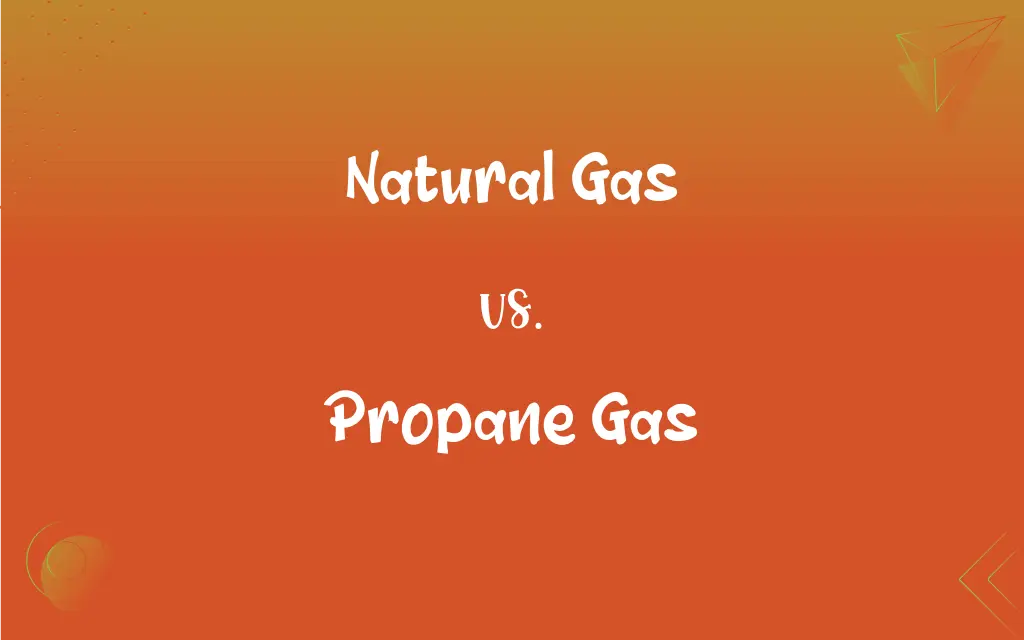Natural Gas vs. Propane Gas: What's the Difference?
Edited by Janet White || By Harlon Moss || Updated on October 16, 2023
Natural gas is methane-rich, sourced underground; propane is a byproduct of natural gas processing and petroleum refining.

Key Differences
Natural gas, primarily composed of methane, is a fossil fuel extracted from deep underground rock formations or hydrocarbon reservoirs. Propane gas, however, is a hydrocarbon that falls under the category of liquefied petroleum gases (LPGs), derived during the processing of natural gas and the refining of crude oil.
In terms of utilization, natural gas is often used in its raw form for heating, electricity generation, and cooking. Propane gas, being more energy-dense, is commonly stored in liquid form in tanks and used in heating systems, stoves, and engines.
From an environmental perspective, natural gas is touted as cleaner, producing less carbon dioxide per energy unit compared to other fossil fuels. Propane gas also burns cleaner than other fossil fuels, emitting fewer pollutants and greenhouse gases.
Regarding infrastructure, natural gas requires an extensive pipeline network for transportation to homes and industries. In contrast, propane gas, stored in tanks, offers more flexibility in transportation and location of use.
Economically, the cost of natural gas can be more stable, being less subject to supply shocks or geopolitical issues, whereas propane prices can fluctuate more due to factors like crude oil prices, demand, and logistical costs.
ADVERTISEMENT
Comparison Chart
Composition
Mostly methane, with ethane, propane, butane
Hydrocarbon compound, C3H8
Origin
Extracted from underground rock formations
Byproduct of natural gas processing, oil refining
State at Room Temperature
Gaseous
Liquid under pressure, gaseous when released
Energy Density
Lower energy density
Higher energy density
Infrastructure
Requires pipeline distribution
Stored in tanks, more portable
ADVERTISEMENT
Natural Gas and Propane Gas Definitions
Natural Gas
Considered cleaner-burning compared to coal and oil.
Environmentalists prefer natural gas over coal for electricity production due to its lower carbon emissions.
Propane Gas
Stored in liquid form and can be transported in tanks.
Rural homes often use propane gas tanks as their primary heating source.
Natural Gas
Used for electricity generation, heating, and as a vehicle fuel.
Due to its efficiency, natural gas has become the primary fuel for new power plants.
Propane Gas
A three-carbon alkane, typically a colorless and odorless liquid under pressure.
We keep a tank of propane gas for our barbecue grill.
Natural Gas
Extracted from deep underground rock formations.
New technologies have made it easier to extract natural gas from shale formations.
Propane Gas
Used in heating, cooking, and as a fuel for vehicles.
During the camping trip, we used propane gas to fuel our portable stove.
Natural Gas
A fossil fuel composed primarily of methane.
The heating system in our house operates on natural gas.
Propane Gas
Burns cleaner than gasoline and other fossil fuels.
Many fleet vehicles use propane gas due to its cost-effectiveness and lower emissions.
Natural Gas
Transported via large pipelines and local distribution systems.
The city's infrastructure development plan includes an expansion of the natural gas pipeline network.
Propane Gas
Derived from the processing of natural gas and the refining of crude oil.
The local refinery produces a significant amount of propane gas as a byproduct.
FAQs
How is propane gas produced?
Propane is produced during natural gas processing and oil refining.
Is natural gas renewable?
No, natural gas is a non-renewable fossil fuel.
What is propane gas?
Propane gas is a hydrocarbon (C3H8), usually found mixed with natural gas and petroleum deposits.
Which is more energy-efficient, natural gas or propane?
Propane has a higher energy density than natural gas.
What is natural gas?
Natural gas is a hydrocarbon gas mixture consisting primarily of methane, found in underground rock formations.
Are there safety concerns with natural gas?
Yes, it's flammable, can cause explosions if leaked, and requires proper handling and systems.
Can natural gas and propane be used interchangeably?
No, appliances specific to one fuel type require modifications to use the other.
Can propane be derived from renewable sources?
Traditionally, no, but there's ongoing research into renewable bio-propane production.
How is natural gas used?
Natural gas is used for heating, cooking, electricity generation, and as a vehicle fuel.
Can natural gas be used in cars?
Yes, some vehicles are designed to run on compressed natural gas (CNG).
How is natural gas transported?
It's moved by pipelines over land and in liquefied form (LNG) by ships.
What's the cost comparison between natural gas and propane?
Natural gas is generally cheaper per BTU, but infrastructure and local prices affect costs.
How is natural gas sourced?
Natural gas is extracted from deep underground natural reservoirs and through hydraulic fracturing.
Is propane dangerous?
Propane, like all fuels, poses fire and explosion risks if not properly controlled.
What's the future of natural gas and propane in green energy?
Both may serve as transitional fuels, but the focus is shifting to renewable energies.
What are common uses of propane?
Propane is used in heating, cooking, refrigeration, and as a transportation fuel.
Is natural gas environment-friendly?
Natural gas burns cleaner than other fossil fuels but still contributes to greenhouse gas emissions.
Does burning propane affect the environment?
Propane produces fewer emissions than many fuels but is still a greenhouse gas source.
How is propane gas usually stored and delivered?
Propane is stored in liquid form in tanks and delivered by truck.
Is propane a popular automotive fuel?
Yes, propane is used worldwide in vehicles as liquefied petroleum gas (LPG).
About Author
Written by
Harlon MossHarlon is a seasoned quality moderator and accomplished content writer for Difference Wiki. An alumnus of the prestigious University of California, he earned his degree in Computer Science. Leveraging his academic background, Harlon brings a meticulous and informed perspective to his work, ensuring content accuracy and excellence.
Edited by
Janet WhiteJanet White has been an esteemed writer and blogger for Difference Wiki. Holding a Master's degree in Science and Medical Journalism from the prestigious Boston University, she has consistently demonstrated her expertise and passion for her field. When she's not immersed in her work, Janet relishes her time exercising, delving into a good book, and cherishing moments with friends and family.































































